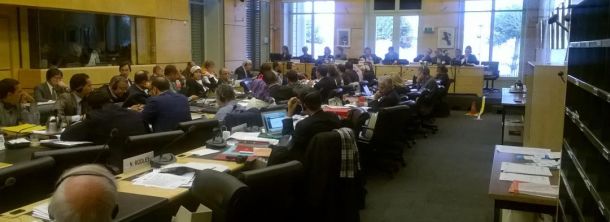UN committee concerned of lack of Saharawi consent over resources

A UN expert human rights committee looking into how Morocco is handling civil and political rights, today expressed deep concerns of the management of the natural resources in Western Sahara, the stalemate in the process of self-determination for the Saharawis, and torture against Saharawis.
Published 04 November 2016
Photo above: Morocco being questioned by the ICCPR human rights committee, 25 October 2016.
The report, which was published on 4 November 2016, is so far only published in French, and is entitled "Observations finales concernant le sixième rapport périodique du Maroc".
The report comes after a year-long process, whereby Morocco has presented to the committee how it deals with the civil and political rights. On 24-25 October, Morocco was questioned by the committee, and today, the anticipated conclusion of the process was presented.
The report, and all associated files, can be dowloaded from the the page of the UN Human Rights Council's Center for Civil and Political Rights. Among the downloadable files, are two submission presented by WSRW to the committee: one 31-page document in 2015 and a 4-page comment in 2016.
The expert ICCPR committee is "concerned by: a) the limited progress achieved on the question relating to the self-determination of the people of Western Sahara; b) the information according to which the State party has not taken all necessary measures to consult the people of Western Sahara on the exploitation of the natural resources of Western Sahara; c) the presence of the sand wall that limits the free movement of the people of Western Sahara"
This echoes similar findings from the sister committee, CESCR, from last year. Following the CESCR statement in 2015, the Moroccan government responded with rejection of all points, claiming the experts are partial.
In addition to the most substantial paragraph on self-determination referred to above (and copied in its entirety below), the committee was also concerned about:
Translation into English below by WSRW, [with brackets being comments from WSRW].
Right to self-determination
9. The Committee takes note of the Moroccan initiative for the negotiation of an Autonomy law [statute] for the region of Western Sahara and the additional information submitted by the State party [i.e. Morocco], but it remains concerned by: a) the limited progress achieved on the question relating to the self-determination of the people of Western Sahara; b) the information according to which the State party has not taken all necessary measures to consult the people of Western Sahara on the exploitation of the natural resources of Western Sahara; c) the presence of the sand wall that limits [restricts] the free movement of the people of Western Sahara [as a result of] the reduced access for civilians and the presence of land mines and other explosive munitions along the sand wall which poses danger to the life and safety of the populations which live nearby (Articles 1, 6, and 12 [of the ICCPR]).
10. The State party must: a) pursue and strengthen efforts within the context of negotiations concerning the status of Western Sahara required under the auspices of the UN Secretary-General in a manner that ensures realization of the right to self-determination of the people of Western Sahara; b) reinforce the consultative process with the people of Western Sahara with the goal of obtaining their prior, free and informed consent to the realization of developmental projects and [resource] extraction operations; and c) take the necessary measures to allow the people of Western Sahara to move [travel] freely and in safety from one side of the wall to the other and pursue a program of de-mining along the length of the wall and compensate victims.
The version of the document today is labelled "advanced and unedited".
News
EU Court adviser confirms separate and distinct status of Western Sahara
The Advocate General of the EU’s top Court backs the legal status of the people of Western Sahara. Final Judgment expected in a few months.
21 March 2024
EU Court adviser: fruit from Western Sahara should not be labelled as from Morocco
Labelling those products as originating in the Kingdom of Morocco instead of originating in Western Sahara breaches EU law, the Advocate General of the EU Court of Justice concludes.
21 March 2024
COWI abandons future projects in Western Sahara
After undertaking work for the Moroccan state phosphate company in Western Sahara, the Danish consultancy giant COWI states that it “will not engage in further projects" in the occupied territory.
11 March 2024
Report: EU-Morocco fisheries depends on illegal occupation
An external evaluation report on the EU-Morocco fisheries agreement 2019-2023 confirms that the agreement revolves, in its entirety, around Western Sahara.
08 March 2024



